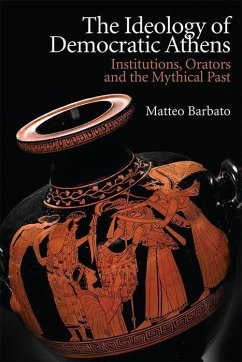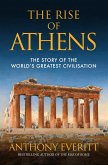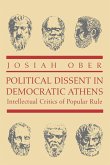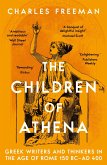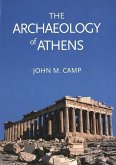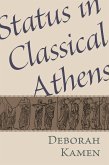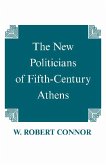- Gebundenes Buch
- Merkliste
- Auf die Merkliste
- Bewerten Bewerten
- Teilen
- Produkt teilen
- Produkterinnerung
- Produkterinnerung
The debate on Athenian democratic ideology has long been polarised around two extremes. A Marxist tradition views ideology as a cover-up for Athens' internal divisions. Another tradition, sometimes referred to as culturalist, interprets it neutrally as the fixed set of ideas shared by the members of the Athenian community.
Andere Kunden interessierten sich auch für
![The Rise of Athens The Rise of Athens]() Anthony EverittThe Rise of Athens29,99 €
Anthony EverittThe Rise of Athens29,99 €![Political Dissent in Democratic Athens Political Dissent in Democratic Athens]() Josiah OberPolitical Dissent in Democratic Athens62,99 €
Josiah OberPolitical Dissent in Democratic Athens62,99 €![The Children of Athena The Children of Athena]() Charles FreemanThe Children of Athena11,99 €
Charles FreemanThe Children of Athena11,99 €![A War Like No Other A War Like No Other]() Victor Davis HansonA War Like No Other20,99 €
Victor Davis HansonA War Like No Other20,99 €![The Archaeology of Athens The Archaeology of Athens]() John M. CampThe Archaeology of Athens48,99 €
John M. CampThe Archaeology of Athens48,99 €![Status in Classical Athens Status in Classical Athens]() Deborah KamenStatus in Classical Athens39,99 €
Deborah KamenStatus in Classical Athens39,99 €![The New Politicians of Fifth-century Athens The New Politicians of Fifth-century Athens]() W. Robert ConnorThe New Politicians of Fifth-century Athens21,99 €
W. Robert ConnorThe New Politicians of Fifth-century Athens21,99 €-
-
-
The debate on Athenian democratic ideology has long been polarised around two extremes. A Marxist tradition views ideology as a cover-up for Athens' internal divisions. Another tradition, sometimes referred to as culturalist, interprets it neutrally as the fixed set of ideas shared by the members of the Athenian community.
Hinweis: Dieser Artikel kann nur an eine deutsche Lieferadresse ausgeliefert werden.
Hinweis: Dieser Artikel kann nur an eine deutsche Lieferadresse ausgeliefert werden.
Produktdetails
- Produktdetails
- Verlag: Edinburgh University Press
- Seitenzahl: 264
- Erscheinungstermin: 28. Mai 2020
- Englisch
- Abmessung: 244mm x 165mm x 22mm
- Gewicht: 524g
- ISBN-13: 9781474466424
- ISBN-10: 1474466427
- Artikelnr.: 59415060
- Herstellerkennzeichnung
- Libri GmbH
- Europaallee 1
- 36244 Bad Hersfeld
- gpsr@libri.de
- Verlag: Edinburgh University Press
- Seitenzahl: 264
- Erscheinungstermin: 28. Mai 2020
- Englisch
- Abmessung: 244mm x 165mm x 22mm
- Gewicht: 524g
- ISBN-13: 9781474466424
- ISBN-10: 1474466427
- Artikelnr.: 59415060
- Herstellerkennzeichnung
- Libri GmbH
- Europaallee 1
- 36244 Bad Hersfeld
- gpsr@libri.de
Dr Matteo Barbato is Leverhulme Early Career Fellow in Classics and Ancient History at the University of Birmingham.
Preface
List of tables
List of illustrations
Abbreviations
1. Introduction
1.1. A brief history of ideology
1.2. Ideology and democratic Athens
1.3. Ideology, New Institutionalism and social memory
1.4. Myth, memory and institutions in democratic Athens
1.5. Outline of the book
2. Myth and Athenian democracy
2.1. The dramatic festivals and the Panathenaea
2.2. The institutional settings of Attic oratory
2.3. Myth in private contexts
2.4. Myths and variants in democratic Athens
2.5. Conclusions
3. The discursive parameters of Athenian democratic institutions
3.1. The state funeral for the war dead
3.2. The lawcourts
3.3. The Assembly and the Council
3.4. The dramatic festivals
3.5. Conclusions
4. Exclusiveness and eugeneia in the myth of autochthony
4.1. Autochthony, exclusiveness and eugeneia
4.2. Eugeneia: from Homeric society to democratic Athens
4.3. Autochthony and collective eugeneia at the state funeral
4.4. Deconstructing autochthony on the tragic stage
4.5. Autochthony and exclusiveness in Apollodorus' Against Neaera
4.6. Conclusions
5. Between charis and philanthropia: the Heraclidae
5.1. Athens and the Heraclidae: charis or philanthropia?
5.2. Between charis and philanthropia
5.3. Euripidean tragedy and reciprocity
5.4. Lysias and Athenian philanthropia
5.5. Charis and philanthropia in Isocrates' Panegyricus
5.6. Conclusions
6. Fading shades of hybris: the Attic Amazonomachy
6.1. Hybris and the causes of the Attic Amazonomachy
6.2. Hybris: an introduction
6.3. Lysias: the state funeral and the discourse of hybris
6.4. Theseus and the Amazons in Aeschylus' Eumenides
6.5. An allusion to the abduction in a private setting?
6.6. Theseus' abduction of Antiope in the figurative arts
6.7. The abduction of Antiope in mythographers and Atthidographers
6.8. The abduction of Antiope in Isocrates' private rhetoric
6.9. Conclusions
7. Combining hybris and philanthropia: the myth of Adrastus
7.1. Philanthropia and hybris: values in interaction
7.2. Athenian philanthropia, Theban hybris: Lysias' Funeral Oration
7.3. Philanthropia, hybris and advantage in Euripides' Suppliant Women
7.4. The myth of Adrastus in Procles' speech to the Assembly
7.5. The myth of Adrastus in a fictional Assembly
7.6. Questioning Theban hybris in a private context
7.7. Conclusions
8. Conclusions
Bibliography
Index locorum
General index
List of tables
List of illustrations
Abbreviations
1. Introduction
1.1. A brief history of ideology
1.2. Ideology and democratic Athens
1.3. Ideology, New Institutionalism and social memory
1.4. Myth, memory and institutions in democratic Athens
1.5. Outline of the book
2. Myth and Athenian democracy
2.1. The dramatic festivals and the Panathenaea
2.2. The institutional settings of Attic oratory
2.3. Myth in private contexts
2.4. Myths and variants in democratic Athens
2.5. Conclusions
3. The discursive parameters of Athenian democratic institutions
3.1. The state funeral for the war dead
3.2. The lawcourts
3.3. The Assembly and the Council
3.4. The dramatic festivals
3.5. Conclusions
4. Exclusiveness and eugeneia in the myth of autochthony
4.1. Autochthony, exclusiveness and eugeneia
4.2. Eugeneia: from Homeric society to democratic Athens
4.3. Autochthony and collective eugeneia at the state funeral
4.4. Deconstructing autochthony on the tragic stage
4.5. Autochthony and exclusiveness in Apollodorus' Against Neaera
4.6. Conclusions
5. Between charis and philanthropia: the Heraclidae
5.1. Athens and the Heraclidae: charis or philanthropia?
5.2. Between charis and philanthropia
5.3. Euripidean tragedy and reciprocity
5.4. Lysias and Athenian philanthropia
5.5. Charis and philanthropia in Isocrates' Panegyricus
5.6. Conclusions
6. Fading shades of hybris: the Attic Amazonomachy
6.1. Hybris and the causes of the Attic Amazonomachy
6.2. Hybris: an introduction
6.3. Lysias: the state funeral and the discourse of hybris
6.4. Theseus and the Amazons in Aeschylus' Eumenides
6.5. An allusion to the abduction in a private setting?
6.6. Theseus' abduction of Antiope in the figurative arts
6.7. The abduction of Antiope in mythographers and Atthidographers
6.8. The abduction of Antiope in Isocrates' private rhetoric
6.9. Conclusions
7. Combining hybris and philanthropia: the myth of Adrastus
7.1. Philanthropia and hybris: values in interaction
7.2. Athenian philanthropia, Theban hybris: Lysias' Funeral Oration
7.3. Philanthropia, hybris and advantage in Euripides' Suppliant Women
7.4. The myth of Adrastus in Procles' speech to the Assembly
7.5. The myth of Adrastus in a fictional Assembly
7.6. Questioning Theban hybris in a private context
7.7. Conclusions
8. Conclusions
Bibliography
Index locorum
General index
Preface
List of tables
List of illustrations
Abbreviations
1. Introduction
1.1. A brief history of ideology
1.2. Ideology and democratic Athens
1.3. Ideology, New Institutionalism and social memory
1.4. Myth, memory and institutions in democratic Athens
1.5. Outline of the book
2. Myth and Athenian democracy
2.1. The dramatic festivals and the Panathenaea
2.2. The institutional settings of Attic oratory
2.3. Myth in private contexts
2.4. Myths and variants in democratic Athens
2.5. Conclusions
3. The discursive parameters of Athenian democratic institutions
3.1. The state funeral for the war dead
3.2. The lawcourts
3.3. The Assembly and the Council
3.4. The dramatic festivals
3.5. Conclusions
4. Exclusiveness and eugeneia in the myth of autochthony
4.1. Autochthony, exclusiveness and eugeneia
4.2. Eugeneia: from Homeric society to democratic Athens
4.3. Autochthony and collective eugeneia at the state funeral
4.4. Deconstructing autochthony on the tragic stage
4.5. Autochthony and exclusiveness in Apollodorus' Against Neaera
4.6. Conclusions
5. Between charis and philanthropia: the Heraclidae
5.1. Athens and the Heraclidae: charis or philanthropia?
5.2. Between charis and philanthropia
5.3. Euripidean tragedy and reciprocity
5.4. Lysias and Athenian philanthropia
5.5. Charis and philanthropia in Isocrates' Panegyricus
5.6. Conclusions
6. Fading shades of hybris: the Attic Amazonomachy
6.1. Hybris and the causes of the Attic Amazonomachy
6.2. Hybris: an introduction
6.3. Lysias: the state funeral and the discourse of hybris
6.4. Theseus and the Amazons in Aeschylus' Eumenides
6.5. An allusion to the abduction in a private setting?
6.6. Theseus' abduction of Antiope in the figurative arts
6.7. The abduction of Antiope in mythographers and Atthidographers
6.8. The abduction of Antiope in Isocrates' private rhetoric
6.9. Conclusions
7. Combining hybris and philanthropia: the myth of Adrastus
7.1. Philanthropia and hybris: values in interaction
7.2. Athenian philanthropia, Theban hybris: Lysias' Funeral Oration
7.3. Philanthropia, hybris and advantage in Euripides' Suppliant Women
7.4. The myth of Adrastus in Procles' speech to the Assembly
7.5. The myth of Adrastus in a fictional Assembly
7.6. Questioning Theban hybris in a private context
7.7. Conclusions
8. Conclusions
Bibliography
Index locorum
General index
List of tables
List of illustrations
Abbreviations
1. Introduction
1.1. A brief history of ideology
1.2. Ideology and democratic Athens
1.3. Ideology, New Institutionalism and social memory
1.4. Myth, memory and institutions in democratic Athens
1.5. Outline of the book
2. Myth and Athenian democracy
2.1. The dramatic festivals and the Panathenaea
2.2. The institutional settings of Attic oratory
2.3. Myth in private contexts
2.4. Myths and variants in democratic Athens
2.5. Conclusions
3. The discursive parameters of Athenian democratic institutions
3.1. The state funeral for the war dead
3.2. The lawcourts
3.3. The Assembly and the Council
3.4. The dramatic festivals
3.5. Conclusions
4. Exclusiveness and eugeneia in the myth of autochthony
4.1. Autochthony, exclusiveness and eugeneia
4.2. Eugeneia: from Homeric society to democratic Athens
4.3. Autochthony and collective eugeneia at the state funeral
4.4. Deconstructing autochthony on the tragic stage
4.5. Autochthony and exclusiveness in Apollodorus' Against Neaera
4.6. Conclusions
5. Between charis and philanthropia: the Heraclidae
5.1. Athens and the Heraclidae: charis or philanthropia?
5.2. Between charis and philanthropia
5.3. Euripidean tragedy and reciprocity
5.4. Lysias and Athenian philanthropia
5.5. Charis and philanthropia in Isocrates' Panegyricus
5.6. Conclusions
6. Fading shades of hybris: the Attic Amazonomachy
6.1. Hybris and the causes of the Attic Amazonomachy
6.2. Hybris: an introduction
6.3. Lysias: the state funeral and the discourse of hybris
6.4. Theseus and the Amazons in Aeschylus' Eumenides
6.5. An allusion to the abduction in a private setting?
6.6. Theseus' abduction of Antiope in the figurative arts
6.7. The abduction of Antiope in mythographers and Atthidographers
6.8. The abduction of Antiope in Isocrates' private rhetoric
6.9. Conclusions
7. Combining hybris and philanthropia: the myth of Adrastus
7.1. Philanthropia and hybris: values in interaction
7.2. Athenian philanthropia, Theban hybris: Lysias' Funeral Oration
7.3. Philanthropia, hybris and advantage in Euripides' Suppliant Women
7.4. The myth of Adrastus in Procles' speech to the Assembly
7.5. The myth of Adrastus in a fictional Assembly
7.6. Questioning Theban hybris in a private context
7.7. Conclusions
8. Conclusions
Bibliography
Index locorum
General index

